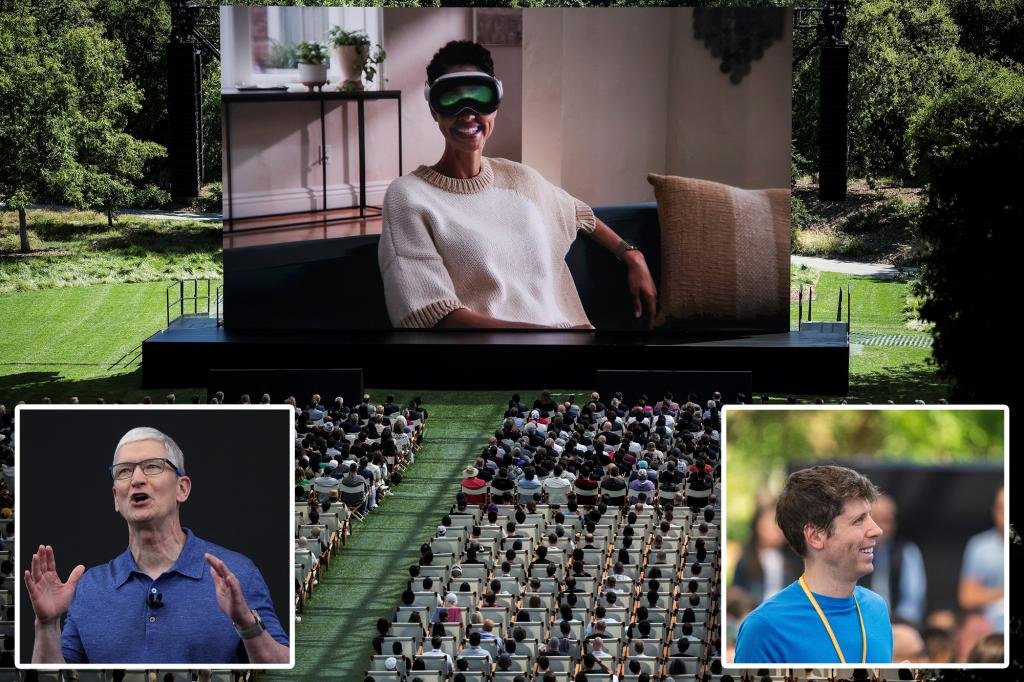Apple unveiled AI features called “Apple Intelligence” and a partnership with ChatGPT maker OpenAI across its devices on Monday as the Big Tech giant seeks to convince Wall Street it is keeping pace in the race to develop the burgeoning technology.
OpenAI boss Sam Altman was seated in the VIP section during Apple’s Worldwide Developer Conference, which kicked off with a heavily stylized intro in which Apple executives were seen “skydiving” down to the company’s headquarters.
As part of a long-teased partnership with OpenAI, ChatGPT will be integrated into Apple’s Siri voice assistant for free starting this fall.
Apple CEO Tim Cook called the AI integration a “game changer” and the “next big step” for the company as OpenAI CEO Sam Altman watched from the audience in Cupertino, Calif.
The features, however, only will be available on Apple’s most expensive iPhone 15 Pro model, as well as Macs and iPads equipped with its in-house computer chips.
Despite the hype, Apple shares sank nearly 2% as Cook and other executives detailed the plans.
Elon Musk, who is launching his own AI company, wasn’t thrilled with the Apple’s new partnership.
The Tesla and SpaceX mogul said he will ban Apple devices at his companies if the iPhone maker integrates OpenAI at the OS level.
“That is an unacceptable security violation,” Musk wrote on X.
“And visitors will have to check their Apple devices at the door, where they will be stored in a Faraday cage.”
Apple’s new AI software’s capabilities include prioritizing notifications based on importance, writing tools that can proofread and summarize text and the creation of AI-generated images within text conversations, or pulling up specific pictures or files based on a user prompt.
Siri will also be capable of carrying out tasks in specific apps based on the user’s voice prompts or answering questions about how device features work.
Cook insisted Apple Intelligence was “built with privacy from the ground up.” The company said its AI system does not collect personal data from users,
The event was considered a critical moment for Apple, which has been under some pressure since the start of the year due to broadening antitrust scrutiny and questions from investors about its slow entry into AI.
While the integration will likely bolster Apple’s slumping iPhone sales by forcing users to upgrade their devices, investors were underwhelmed by a lack of in-house AI innovations from Apple itself, according to Daniel Newman, CEO of the tech research firm Futurum Group.
“It was good, but you didn’t build a $3 trillion valuation on being good,” Newman told The Post. “You built it on being great and a lot of what I saw here felt like what Microsoft has been doing over two years. Apple has the install base advantage, but I think everyone wanted more.”
Wedbush analyst Daniel Ives disagreed. He described the AI-centric presentation as “the biggest event in over a decade” for Apple – and said the company is poised for a major uptick and smartphone sales.
“Apple is taking the right path to implement AI across its ecosystem while laying out the foundation for the company’s multi-year AI strategy across the strongest installed base of 2.2 billion iOS devices over the coming years, with the Street giving no credit for AAPL’s AI monetization,” Ives said in a note to investors.
Apple also detailed upgrades included in the latest iPhone software, iOS 18.
New features include the ability to personalize app placements and icon colors on the home screen.
Users can “lock” specific apps to ensure that strangers can’t access them without “Face ID” or log-in credentials, even if they are past the home lock screen.
On the messages app, users will be able to react to texts with more emojis and animated effects via an expanded “Tapbacks” feature, as well as send texts on a delay via a “send later” feature.
Later this year, Apple plans to roll out updates for its Mail app that organize emails by various categories, including transactions, social updates and shopping promotions.
On the company’s streaming service Apple TV+, viewers will gain the ability to highlight specific actors or songs from shows as they play.
Elsewhere, iPad users will get access to a long-awaited “Calculator” app specifically for the tablets, as well as new home screen personalization features.
The tech giant also announced updates for its Vision Pro mixed-reality headset. The company is expanding its availability to other countries, with pre-orders set to begin in China on June 13 and in the UK, Australia, Canada, France and Germany beginning June 28.
Apple unveiled upgraded “VisionOS 2” operating system for the headsets and said there are now more than 2,000 apps developed specifically for the device.
Executives touted the Vision Pro’s use on trips by noting that its “Travel Mode” is now compatible with train trips as well as well flights.
The company’s computer operating system, macOS, will get iPhone notifications for Macs and “Phone Mirroring” for Mac displays, as well as a Passwords app to securely store log-in information for a variety of apps.

















